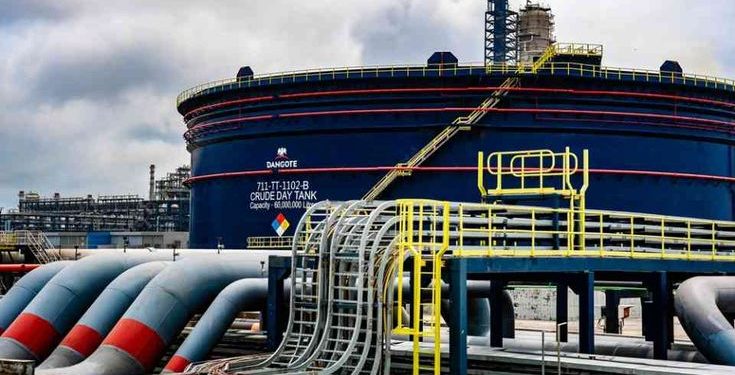Dangote Petroleum Refnery, owned by Nigerian billionaire Aliko Dangote, has unveiled plans to construct a large-scale fuel storage facility in Walvis Bay, Namibia.
The upcoming infrastructure, which will include tanks capable of holding at least 1.6 million barrels of refined gasoline and diesel, signals a strategic push to enhance energy security and distribution efficiency across Southern Africa.
Strategic Expansion to Southern Africa
According to reports from Business Insider South Africa, this development forms part of the refinery’s broader ambition to dominate fuel supply across the African continent, leveraging Nigeria’s evolving position as a petroleum export powerhouse.
With Namibia’s Walvis Bay serving as a major commercial and logistics hub on the southwest coast of Africa, the move is seen as a calculated effort by the Dangote Group to tap into growing demand for refined fuels in Namibia, Botswana, Zambia, Angola, and other parts of the Southern African region.
Energy analysts say the storage hub could reshape regional fuel trade routes, significantly cutting down delivery times and offering more affordable refined petroleum products in the region.
Africa’s Largest Refinery on the Move
Commissioned in 2024, the $20 billion Dangote Petroleum Refinery is located in Lekki Free Trade Zone, Lagos, Nigeria, and is the largest single-train refinery in Africa and among the biggest globally with a processing capacity of 650,000 barrels of crude oil per day.
Bloomberg has ranked the facility above Europe’s top ten refineries in terms of capacity. The refinery produces a range of refined petroleum products including:
- Premium Motor Spirit (PMS or gasoline)
- Automotive Gas Oil (diesel)
- Jet A1 (aviation fuel)
- Liquefied Petroleum Gas (LPG)
- Naphtha
Since operations began, the refinery has steadily ramped up production and is currently operating at increased capacity while expanding its logistics, storage, and export infrastructure across Africa.
Nigeria Emerges as a Net Exporter
Thanks to the Dangote Refinery, Nigeria has transitioned from being a major fuel importer to a net exporter of refined petroleum products — a historic milestone for the oil-rich West African nation.
By refining its own crude locally and exporting high-value petroleum products, Nigeria is significantly reducing its reliance on foreign refineries, saving billions in foreign exchange, and boosting its trade balance.
This has also paved the way for new bilateral trade partnerships, positioning Nigeria as a key energy hub for the continent, and offering African countries an alternative, intra-continental fuel supply source.
Continental Impact and Future Outlook
Dangote Group’s decision to invest in fuel storage infrastructure outside Nigeria highlights the company’s commitment to building a pan-African energy distribution network. Once completed, the Walvis Bay facility is expected to:
- Improve access to affordable fuel in remote regions of Southern Africa
- Reduce fuel shortages and logistical bottlenecks
- Serve as a launching pad for Dangote products in the Southern African Development Community (SADC) zone
- Enhance Namibia’s role as an energy corridor in Africa
Industry experts describe the plan as “visionary” and a major win for regional energy security and trade integration under the African Continental Free Trade Area (AfCFTA)
























































